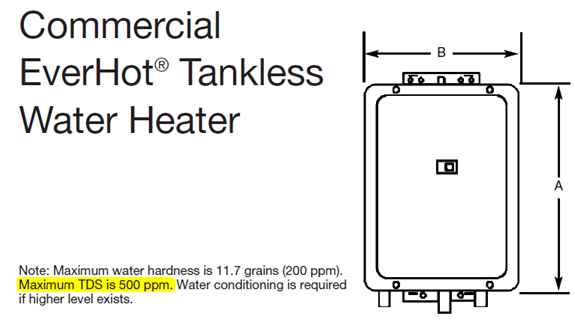There’s nothing like taking a long hot shower on a cold winter night.
And when you need hot water, few things are more frustrating than waiting, and waiting, and waiting for the water to get hot.
Because 25% of your utility bill is spent heating your water, it makes sense to do it as efficiently as possible.
In 2010, there was a lot of excitement about Tankless Water Heaters and High Effiency Water Heaters. The push was so strong, you could even get huge rebates and tax incentives to install an energy efficient Water Heater.
But little attention was given to the actual water used in these heaters.
This article will take a deeper look at how Water Quality can make or break Water Heater efficiency and lifespan – regardless of make or model.
Sediment Buildup Increases Energy Use by 70%
As water heaters age, they tend to accumulate sediment deposits and debris.
If your water takes longer to heat up, or it seems like you don’t have as much hot water as you used to, you might have sediment buildup in your tank.
Over time, sediment will build up to a level that acts as a barrier between the burner and the water. This has an effect equal to placing a stack of bricks on a stove, and then trying to boil water.
It makes it much harder heat.
An article published in a national ASPE plumbing journal states:
A water softener does a good job of protecting your water heater from up from Hard Water, but it offers zero protection from sediment buildup.
Combined with a reliable Water Softener, a mechanical Sediment Filter that removes sediment 20 microns and larger would go a long way towards protecting your water heater.
Corrosion from High TDS Cuts Life by 50%
Pure Water contains only Hydrogen and Oxygen.
Most tap water is rarely “pure”. It usually contains salts, metals, disinfectants like chlorine and suspended particles (also known as Total Dissolved Solids).
In small concentrations, these contaminants are usually not bad for you even though they may contribute to poor taste and smell of the water.
These water contaminants also impart a slight conductivity to the water.
For this reason, many Water Heater manufactures recommend a maximum Total Dissolved Solids(TDS) limit of 500ppm:
Most water heaters are made of a steel tank with a porcelain enamel (glass) lining. Due to production and assembly methods, it is not always possible to completely cover the inside of the tank.
Therefore it’s important to provide metal that can be consumed by the electrical process. This is where the sacrificial anode rod comes in. By acting as a lightning rod for the corrosion process, the anode rod draws the harmful electrolytic process away from the water heater tank and focuses the corrosion on the anode rod. When this rod breaks down, it gives the hot water a “rotten egg smell”.
Water Softeners are effective at protecting water heaters from hard water damage, but the ion exchange process used to soften actually adds salt to the water. This increases the Total Dissolved Solid level, and can speed up the breakdown of the anode rod.
A Whole House Purification System like the Pureoflow, not only removes hardness and sediment, but it also removes dissolved salts and metals down to 0.0001 microns in size. The Pureoflow uses a type of Reverse Osmosis technology to physically separate pure water from the hardness minerals (dissolved rock).
Pure water that is void of hardness, sediment, salts, and metals, offers the best protection against corrosion in water heaters.
Heat Water Faster, with Less Energy
In the Twin Cities, the average groundwater temperature is 51 degrees Fahrenheit.
All year long, most mechanical rooms are kept somewhere between 65-70 degrees.
Whole house purifiers like the Pureoflow, literally make pure water 1 drop at a time. As each droplet is made, it is collected in a storage tank. This storage tank is installed in the mechanical room – right next to the water heater.
With a “Pure Water System”, the Water Heater only has to raise the water temperature from 65 to 140 degrees (75 degree increase), as opposed to 51 to 140 degrees (89 degree increase).
By giving a Water Heater an easier job, you get hot water faster, and it takes less energy to get it.
Conclusion
Soft water has been a staple for homes and businesses for years. Protecting water heaters from hard water has probably saved you $1,000’s of dollars in wasted energy and service repairs.
Pure water takes those savings to the next level, and it tastes better too 🙂
About Premier Water
Premier Water is a local, family-owned water treatment company based in Chanhassen, MN. Since 1978, Premier Water has successfully implemented 1000’s of Residential and Commercial Water Purification Systems. We offer a FREE WATER TEST to gather information and help our clients with the right solution for their needs. We can also be reached at (952) 479-4553 for more information.



